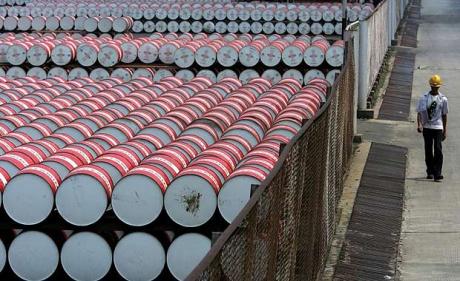With global oil prices currently falling to $87 amidst fears of further collapse, Nigeria would be the worst-hit African oil exporter if this drop should persist, the Business Insider says in its article that lists Nigeria among Saudi Arabia, Bahrain, Oman, Russia and Venezuela as the countries that would be the most adversely hit by a price collapse.
With the aforementioned countries needing oil to remain above a certain price in order for their governments to meet spending commitments, Business insider says the effect of a price collapse could be as severe as a recession for some of the aforementioned.
Recession for Nigeria? Perhaps not. But here are five reasons a continuous fall in oil prices would be very devastating for Africa’s Largest Economy.
Overt Oil Dependence: 75 percent of the Nigerian government’s revenue comes from taxes on the oil and gas sector, and while oil is part of the 14 percent that resources contribute to Nigeria’s rebased GDP, much of the fast growing sectors- Manufacturing Agriculture, Real Estate and others, leverage on the country’s huge oil invoice. Oil revenue also ends up as earnings for individuals, meaning rising oil prices contribute to increased consumption for primary benefactors. But a decrease would be devastating. Asides shrinking government’s purse, citizens’ purse would also deplete meaning the retail boom for example could suffer a direct hit. Given, that Nigeria’s diversification drive is gaining ground, it would be extremely bad timing for the oil income crunch to come now.
Foreign Exchange: Oil and gas make up more than 90 percent of exports, providing the critical source of Nigeria’s foreign exchange. It’s that simple; a collapse in oil prices could lead to the same in Nigeria’s foreign exchange which is crucial to support consumption of imports. Foreign exchange rates also influence capital flows- investment funds that move into and out of a country. If oil prices continue to drop it would have an adverse effect on the country’s currency value, making it less attractive to foreign investors. Currently the growing beehive for investors, such fate would be devastating to the economy.
Savings: With much of the government’s revenue funded by oil, funds for its capital and recurrent spending is heavily reliant on the income from the commodity, so too is its fund for savings. Nigeria’s Excess Crude Account as well as Sovereign Wealth Fund and other savings schemes with which the country weathers unforeseen storms are all funded by oil revenues. If oil price falls, funds will dry and so too will the country’s ability to withstand shocks. Although Nigeria has $4.1 billion in its excess crude account – money kept for such oil price shocks – it is still a little far off the World Bank advised sum of $6.3 billion. Despite Finance Minister’s assurance of government “being on top of the game”, fears remain alive that if oil price perpetually falls, the government’s saving-ability could become weakened.
Debt: In 2004, prior to the Paris Club debt relief, Nigeria’s external debt stood at $35.9 billion with the country having to pay an annual $4.9 billion every year on debt servicing. Fears exist that the past may look familiar with the future if the feared collapse becomes reality. If oil price becomes and remains depressed, Nigeria could be forced to borrow more to balance its oil revenue-dependent budget. Currently the country’s external indebtedness is low at $6.67 billion or about three percent of GDP with the financial authorities saying it keeps a tight leash on its external borrowing. If government revenues fall from a plummeting global oil price, further debt accumulation could become unavoidable. An alternative to borrowing is cutting back on spending, a potential catalyst for social unrest.
Price of PMS: Here comes the primary catalyst of social unrest, which could be activated by a continuous fall of oil prices. A steep drop in government revenue from oil could directly lead to a new push to completely pull out subsidy on petroleum products. The last time the country’s leadership attempted this, it led to nationwide protests before it quelled following an agreement the country’s labour union for a partial removal. That time however, the government’s reason for seeking to remove the subsidy was to make available more funds for capital projects, should oil prices drop its funds dry up, avoiding the social unrest may be impossible.









